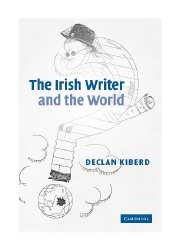Book contents
- Frontmatter
- Contents
- Acknowledgements
- A note on the text
- 1 Introduction
- 2 The fall of the Stage Irishman (1979)
- 3 Storytelling: the Gaelic tradition (1978)
- 4 Writers in quarantine? The case for Irish Studies (1979)
- 5 Synge, Yeats and bardic poetry (2002)
- 6 George Moore's Gaelic lawn party (1979)
- 7 The flowering tree: modern poetry in Irish (1989)
- 8 On national culture (2001)
- 9 White skins, black masks: Celticism and Négritude (1996)
- 10 From nationalism to liberation (1997)
- 11 The war against the past (1988)
- 12 The Elephant of Revolutionary Forgetfulness (1991)
- 13 Reinventing England (1999)
- 14 Museums and learning (2003)
- 15 Joyce's Ellmann, Ellmann's Joyce (1999)
- 16 Multiculturalism and artistic freedom: the strange death of Liberal Europe (1993)
- 17 The Celtic Tiger: a cultural history (2003)
- 18 The city in Irish culture (2002)
- 19 Strangers in their own country: multiculturalism in Ireland (2001)
- Index
3 - Storytelling: the Gaelic tradition (1978)
Published online by Cambridge University Press: 22 September 2009
- Frontmatter
- Contents
- Acknowledgements
- A note on the text
- 1 Introduction
- 2 The fall of the Stage Irishman (1979)
- 3 Storytelling: the Gaelic tradition (1978)
- 4 Writers in quarantine? The case for Irish Studies (1979)
- 5 Synge, Yeats and bardic poetry (2002)
- 6 George Moore's Gaelic lawn party (1979)
- 7 The flowering tree: modern poetry in Irish (1989)
- 8 On national culture (2001)
- 9 White skins, black masks: Celticism and Négritude (1996)
- 10 From nationalism to liberation (1997)
- 11 The war against the past (1988)
- 12 The Elephant of Revolutionary Forgetfulness (1991)
- 13 Reinventing England (1999)
- 14 Museums and learning (2003)
- 15 Joyce's Ellmann, Ellmann's Joyce (1999)
- 16 Multiculturalism and artistic freedom: the strange death of Liberal Europe (1993)
- 17 The Celtic Tiger: a cultural history (2003)
- 18 The city in Irish culture (2002)
- 19 Strangers in their own country: multiculturalism in Ireland (2001)
- Index
Summary
In 1888, that prince of literary diplomats, Henry James, observed with some tact that ‘the little story is but scantily relished in England, where readers take their fiction rather by the volume than by the page’. Pondering this text almost seventy years later, Sean O'Faolain remarked with a kind of baffled triumph that ‘the Americans and Irish do seem to write better stories’. The short story as a literary form has flourished in many countries besides Ireland and America. The Russians of the past century are rightly regarded as masters of the genre and Chekhov is justly celebrated as the master of the Russians. France, too, has produced many great storytellers in the tradition of Daudet and Maupassant. In his study of the genre, Mr O'Faolain attempted to explain why the English, who have given the world so many great novels, should have failed so spectacularly to master the short story. He concluded that English readers preferred the social scope of the novel to the more private concerns of the short story. English writers, he believed, found a natural form for expressing their social philosophy in the extended narrative. The short story, on the other hand, was ‘an emphatically personal exposition’. Mr O'Faolain offered various explanations for the strength of the shorter genre in other countries. The form had prospered in the United States because ‘American society is still unconventionalized’, in Ireland because her people were still ‘an unconventional and comparatively human people’, and in France which was ‘the breeding ground of the personal and original way of looking at things’.
- Type
- Chapter
- Information
- The Irish Writer and the World , pp. 42 - 51Publisher: Cambridge University PressPrint publication year: 2005
- 1
- Cited by



